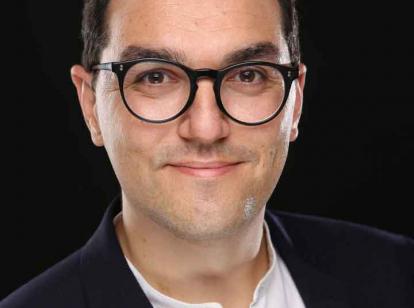Dr. Jacopo Di Russo is new Associated Scientist at DWI
DWI is now profiting from the expertise of Dr. Jacopo Di Russo: The mechanobiologist joined DWI as an Associated Scientist in April. He heads the "Retinal Epithelium Mechanobiology and Disease" (REMeD) research group at the Interdisciplinary Center for Clinical Research (IZKF) at the University Hospital of RWTH Aachen University. Jacopo Di Russo‘s association at DWI follows on from ongoing joint research projects.
Mechanobiology: How do cells react to mechanical forces?
The aim of Jacopo Di Russo's scientific work is to understand the interaction of biochemical and physical information of the so-called extracellular matrix (ECM) in controlling the mechanobiology of epithelial tissues. The ECM is a gel-like structure consisting of different components that fills the spaces between cells in both humans and animals. The term "epithelium" refers to cell layers that coat inner and outer surfaces of the body and thus separate them from their environment, as in skin or other organs such as the eye. Epithelia can be either unicellular layers (monolayers) or complex 3D structures consisting of several layers that are self-organized.
The structures and functions of epithelia are not only defined by biochemical processes, but are also highly dependent on physical or mechanical influences. These are for example pressure or shear forces. The field of mechanobiology is devoted to understanding how these influences affect biological components such as epithelia. It is an emerging field of science at the interface of biology, engineering sciences and physics. Researchers in this field focus on how physical forces and changes in the mechanical properties of cells and tissues contribute to development, cell differentiation, physiology and the pathogenesis of disease. A major challenge is the understanding of mechanotransduction. These are the molecular mechanisms by which cells perceive and respond to mechanical signals.
The first DWI project is dedicated to research on an important eye disease
The group of Jacopo Di Russo is investigating epithelial mechanobiology with interdisciplinary experimental approaches such as hydrogel technologies, organoids and in mouse models. DWI and Jacopo Di Russo have already worked together successfully in the field of mechanobiology in the past. Now, in a first project, DWI scientist Laura De Laporte and Jacopo Di Russo will further characterize the dynamic adaptation and transformation of stress (stress dissipation) of epithelia to local mechanical stress (name of the project: "Epithelial adaptation to local stress"). The use of the "beating hydrogels system" established in the group of Laura De Laporte, in combination with cell monolayers, aims to elucidate the processes behind chronic changes of epithelia such as the retinal pigment epithelium in age-related macular degeneration (AMD).
Jacopo Di Russo studied cell biology in Florence (Italy) and then moved to the Westfälische Wilhelms-Universität Münster as a Marie Curie fellow. There he worked under the supervision of Prof. Dr. Lydia Sorokin at the Institute of Physiological Chemistry and Pathobiochemistry and received his doctorate. He investigated how the extracellular matrix influences physiological reactions. In 2015, he began his work in the laboratory of Prof. Dr. Joachim Spatz at the Max Planck Institute for Medical Research in Heidelberg, where he deepened his knowledge of cell adhesion on a biophysical level. Since 2019 he is an independent group leader at the IZKF at the University Hospital of RWTH Aachen University.

